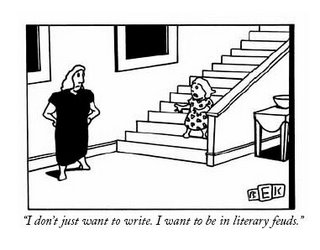Literary feuds can get very exicitng if participants are sufficiently bitchy. In Marathi world, there have been many such feuds.
For instnace- Khandekar Vs. Phadke “Is art only for the sake of art?”. P K Atre Vs. many. B S Mardhekar Vs. G D Madgulkar, P L Deshpande (with a sideshow Govind Talwalkar) Vs. Durga Bhagwat दुर्गा भागवत, Jaywant Dalvi Vs. many and so on.
My father’s first book – “Dhoka, Hamrasta Pudhe Ahe” was savaged by many as obscene but literary critic D K Bedekar defended it, creating quite a spectacle for onlookers. (btw- My father got so scared by fracas, he has never wrtten another controversial book since.)
These days there is almost a drought of feuds in Marathi literary world. In Marathi literary magazine Lalit, some abortive attempts are made from time to time to start one. Alas, those attempts are just that- abortive.
RACHEL DONADIO has written an essay “Art of the Feud” for NYT Nov 19 2006:
‘To some, the paucity of feuds is connected to the larger state of literary culture. “It’s not because we no longer have feuds,” said Fran Lebowitz, the writer. “It’s because we no longer have literature.” ’
 Artist : Bruce Eric Kaplan Publication: The New Yorker 27 Jun 1994
Artist : Bruce Eric Kaplan Publication: The New Yorker 27 Jun 1994